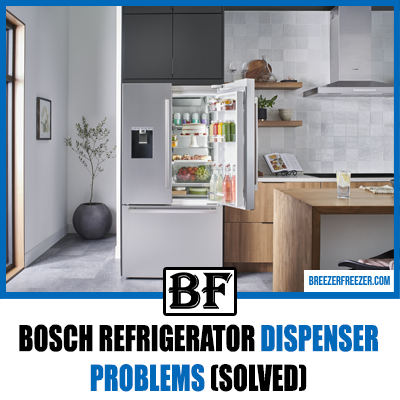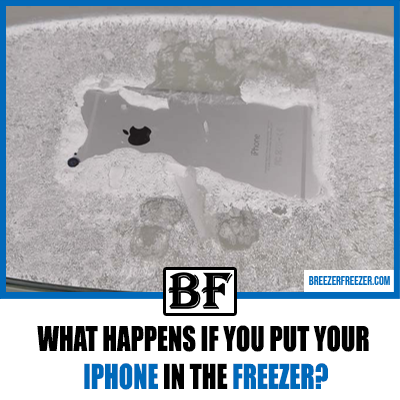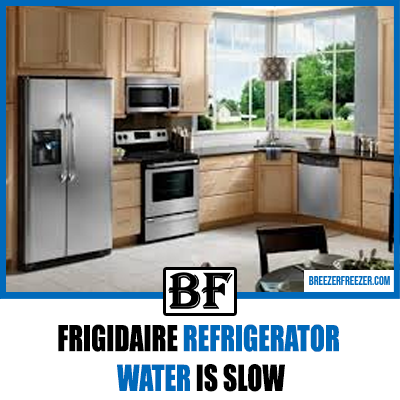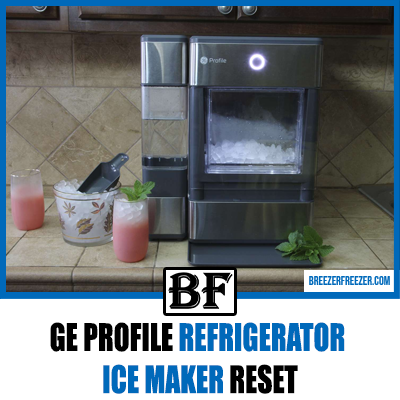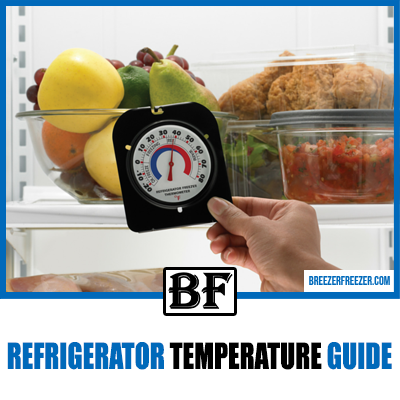Why Does My Bosch Fridge Freeze Food (How To Fix)
Are you annoyed because your Bosch fridge freezes your food all the time? Then we are here for you!

Bosch is a brand that is well known for making one of the most flexible and premium fridges on the market. Moreover, Bosch fridges are known to be extremely energy-efficient and performance proficient.
However, like most home appliances, they are prone to technical issues with time. And one such problem is when the Bosch refrigerator freezes the fresh food abnormally. This leaves the food extremely soggy and inedible.
Nevertheless, this problem can be prevented with a few simple checks and fixes that we have mentioned below. So, without any further delay, let’s dive into the next sections!
Why Is My Bosch Refrigerator Freezing Food?
There are several factors that can cause your Bosch fridge to freeze abnormally like:
- There is less food in the freezer compartment
- Your fridge is set on the lowest setting for temperature
- A component is causing a problem
In most cases, the freezing food problem is caused due to a faulty or malfunctioning component. Keeping this in mind, we have listed a few components you should check when your food starts to freeze.
1. Temperature Control Board
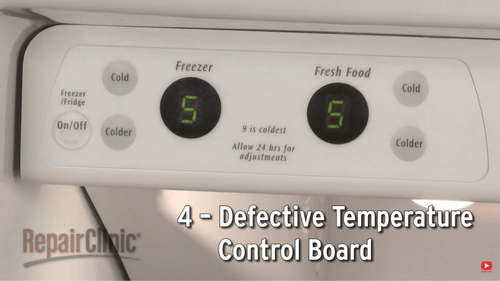
The temperature control board plays a very important role in keeping your Bosch refrigerator running at its optimum capacity. It basically sends voltage to the compressor as well as the fan motor. Hence, a faulty temperature control board will continuously send voltage to the compressor and fan motor without breaking the circuit. This eventually causes the fridge to freeze more than it should have.
You can check if the temperature control board is defective by changing the temperature setting. If you notice that the internal temperature hasn’t changed even after a couple of hours after changing the setting, then you will need to get the temperature control board replaced.
2. Excess Cold Air Circulation
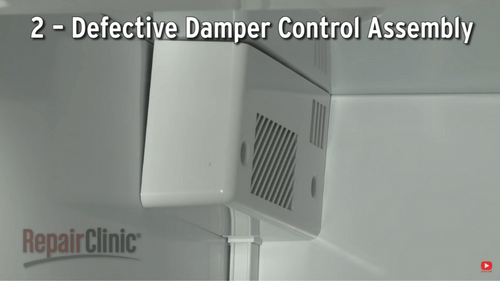
Every Bosch fridge comes equipped with a damper that circulates cold air to the refrigerator and the freezer compartment. The damper control is designed to open and close at periodic intervals, which helps to regulate the temperature of the cold air within the fridge.
However, a broken damper control will not close properly, and this will cause too much cold air to flow without any regulation. On the other hand, there is a high chance of the damper getting blocked due to dust or debris.
In this case, you can clean it with a clean wet cloth after shutting off the power supply to the unit. But if the problem persists, then you will need to get the damper replaced, which is best done by a professional.
3. Thermistor
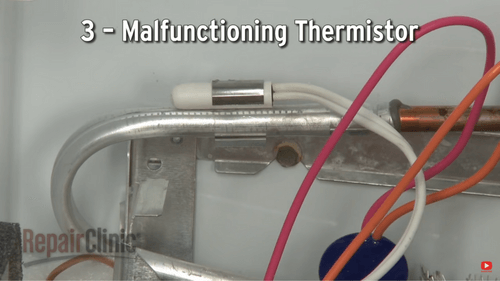
Another important component that can cause your fridge to have a severe freezing problem is low thermistor resistance. A thermistor reads the temperature of the air within the fridge and sends a signal to the main control board. The moment the fridge is too cold, the main control board will regulate the evaporator fan and compressor to increase the temperature.
However, a defective thermistor will fail to read the air temperature correctly. Hence, it will send inaccurate readings to the control board, and this will prevent the components from efficiently regulating the temperature.
Moreover, you will notice that the evaporator fan and compressor will stay on for longer than they should. This is a key indicator that your thermistor is defective and it needs a change.
4. Temperature Control Thermostat
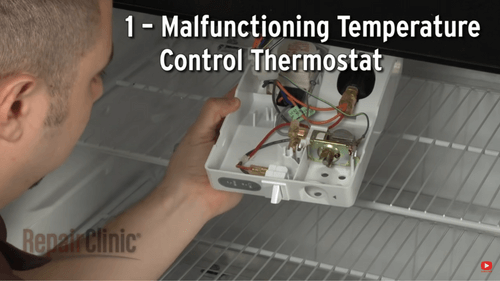
Lastly, the temperature control thermostat directs the power from the mains to the compressor and evaporator fans. A faulty temperature control thermostat will send continuous voltage to the compressor and evaporator fan without any pauses. This will cause the fridge to run longer than it is needed.
You can check the temperature control thermostat by using a multimeter. This device will determine if the thermostat is showing any resistance or not. If it doesn’t show any reading from the temperature control thermostat, then the thermostat should be replaced without further delay.
How To Prevent The Bosch Fridge Freezer Compartment From Freezing Food?
There are three possible ways that can help you prevent your Bosch fridge from freezing the food. We highly recommend identifying the problem first and then following the solutions mentioned below.
First and foremost, you must check the fridge’s temperature and adjust it whenever it gets too cold. Bosch fridge performs optimally when the internal temperature is around 38 to 42-degree Fahrenheit. If you notice that the fridge’s temperature is below the ideal temperature range, you can adjust the temperature to the correct range.
However, try not to exceed the temperature by too much since it can start to warm the fridge from within, which may cause bacteria to form. Apart from this, if your Bosch fridge continues to freeze the fresh food section, then you might need to stock the fridge properly. This will help the cold air distribute evenly, preventing the fridge from freezing everything.
On the other hand, an understocked fridge will not absorb the excess cold air within the fridge, which can lead to frozen food. And the only way to deal with this is by stocking your fridge properly with food to make sure that it doesn’t get too cold.
If these solutions don’t work, then there might be a malfunctioning issue with one of the main components of the fridge. You can either replace or repair these components.
Frequently Asked Questions
How Can You Reset Your Bosch Fridge?
The easiest way to reset your fridge is by turning it off and removing the plug from the mains. Let the fridge sit idle for five minutes, which will allow it to reset the internal temperature.
Then turn on the fridge and give it two hours to cool down. Some Bosch fridge models might take a longer time to cool down, so you should give your fridge at least 24 hours to cool down properly.
Can The Frost Free Feature Cause Bosch Refrigerators To Have Freezing Problems?
Yes! A defective frost-free feature can cause Bosch refrigerators to freeze abnormally. The frost-free system is responsible for regulating the temperature within the fridge. If the fridge gets too cold, it immediately cuts the supply and lets the fridge warm up a little.
However, a defective frost-free system will not cut the power supply, and this causes the fridge to overwork itself.
Can Humidity Affect My Bosch Fridge Freezer?
Definitely. High humidity within the fridge can cause the compressor and evaporator coil to freeze, preventing the fridge from regulating the temperature efficiently. Humidity can enter the fridge whenever you introduce hot food into the freezer compartment.
The steam from the food enters the vent and leaves the coils moist and wet. Hence, it is highly recommended to let food cool down naturally before placing them into your fridge.
Can External Temperature Affect The Cooling Of My Bosch Fridge?
If you are living in a cold region, then there is a high chance that the cold weather condition is preventing your fridge from warming up efficiently. The longer it takes to warm up, the cooler the air remains within.
One of the easiest ways to regulate the temperature of your fridge in cold weather is by manually turning it up whenever you notice the fridge has become too cold from within.
Can Cold Water Supply Affect The Cooling Of Your Bosch Fridge?
Yes! Cold water supply can significantly affect the cooling of your fridge, which causes your fridge to freeze the food. If your fridge is connected to a water supply, make sure to run warm water through the pipes at least once or twice a week.
This will prevent the water from freezing up and help maintain a better internal temperature with the fridge. Your ice cubes might take longer to form, but you wouldn’t face any freezing issues.
Final Words
We will now conclude this guide, but before we leave, we would like to share a few tips that will help you prevent the problem from happening in the future.
Firstly, always make sure to check the thermostat and set the right temperature whenever you notice the fridge is getting too cold. Secondly, try not to keep the fridge door open for too long since moisture from the external air will enter the fridge and freeze the internal coils. This will prevent the fridge from defrosting.
Moreover, you should keep the fridge in a warm room if you live in a cold region since cold external temperatures can cause it to cool down more than usual. Lastly, always make sure to clean the fridge regularly since dirt and dust can prevent the evaporator coil from heating up.
We will be back another day. So, see you next time!
